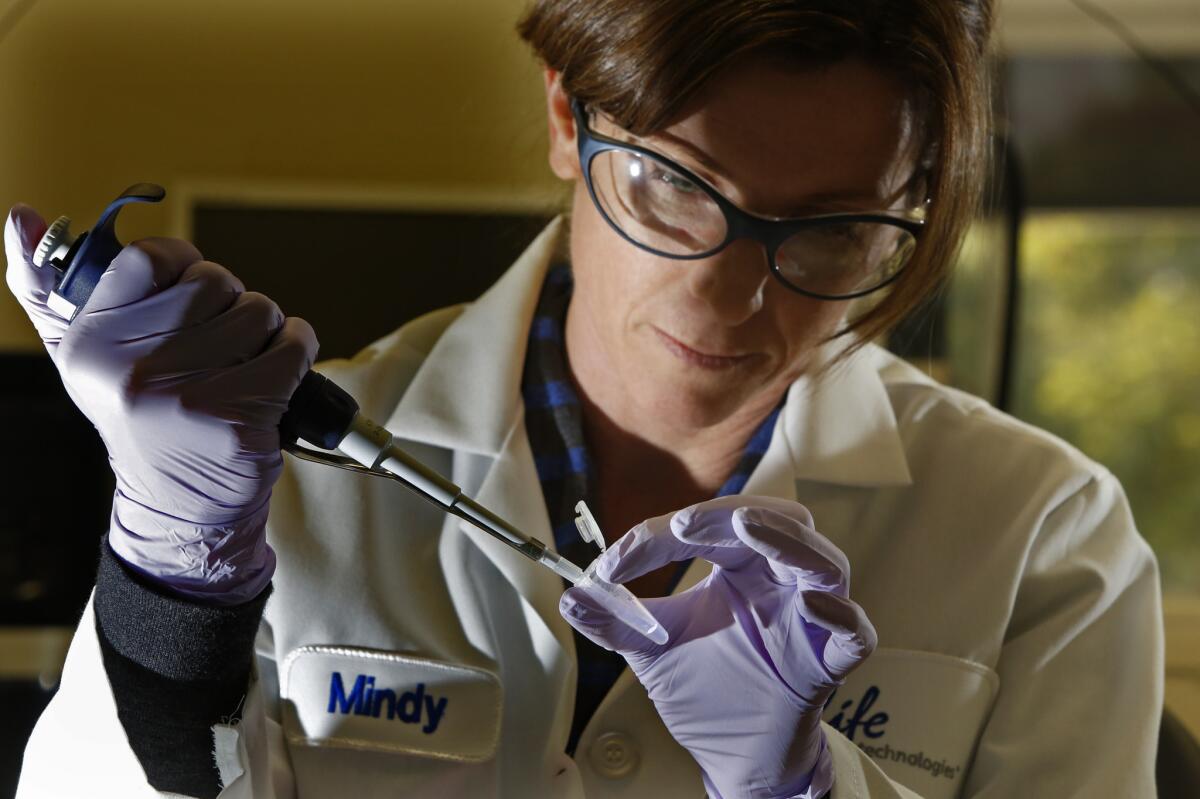Op-Ed: Los Angeles has the right DNA to become biotech hub

- Share via
As the Great Recession decimated U.S. job growth, one sector continued to thrive: biotechnology. Encompassing everything from medical device manufacturing to biopharmaceutical development and the latest diagnostic tools, this industry will no doubt frame humanity’s most important advances in the 21st century.
California is home to two major biotechnology hubs — San Francisco and San Diego — but Los Angeles has been left behind. The paradox is that universities in Los Angeles County produce more than 5,000 graduates in biotechnology-related fields each year, compared with 2,800 in San Francisco-Oakland-Fremont. However, it’s San Francisco that attracted $1.15 billion in biotechnology investment in 2013, compared with a paltry $45 million here. No wonder, then, that so many of our graduates head north.
To reverse this trend, Los Angeles requires an ecosystem that fosters business, venture capital investment and access to academic medical centers for research and clinical trials. My university, USC, hopes to spark this change by building a Biotechnology Park adjacent to our Health Sciences Campus in Boyle Heights.
With the cooperation of Caltech, community colleges, the L.A. Unified School District and other institutions, this will represent the first step in a plan for a robust biotechnology corridor in the surrounding area. The corridor will provide space for established companies, training for entry-level jobs and incubators for start-up firms.
Pharmaceutical, biotechnology and biomedical companies have already expressed interest. Such companies rely on university partners for research and development, and our Biotechnology Park would give them the infrastructure to flourish.
If we get it right, the economic potential is enormous. The initial Biotechnology Park is expected to create 3,000 construction jobs and nearly 4,000 permanent positions, from entry-level technicians to high-wage doctorate-level scientists. But that would be just the start. The entire corridor could be of similar size and scope to San Francisco’s Mission Bay project, which will employ an estimated 30,000 people once completed. The bulk of these jobs will not require an advanced degree. A recent study found that for every high-tech job created, four more are added in fields like marketing, accounting, administration or sales.
In 2012, the research firm Battelle developed a master plan for building up the biotechnology sector in Los Angeles County. It made the case that Los Angeles is primed for growth. The region already has leading research universities, top clinical and research hospitals, a manufacturing base, a massive port and a venture capital presence. A biotechnology corridor would connect these pieces, drawing investment, adding jobs and generating tax revenues for all parts of the county.
Other cities are moving ahead aggressively with their own plans to become biotechnology hubs. In New York City, for instance, officials are creating a public-private venture capital fund designed to launch biotechnology start-ups. If Los Angeles is to stake its claim, it must move quickly.
In the last 15 years, nearly 50 USC start-ups in such industries have headquartered themselves outside Los Angeles because of the city’s lack of infrastructure and facilities. These companies, including successful firms such as ORCA Biosciences (acquired by Epigenomics) and Tocagen, now employ hundreds of people — but in cities such as Seattle and San Diego.
Yet all of the ingredients for Los Angeles to capture growth in this booming field are already here. With the right alignment between government, academia and industry, we can harness the region’s existing strengths — including our science graduates — to create lasting economic growth.
C.L. Max Nikias is the president of USC, which is hosting the Los Angeles Biotech Summit on Thursday at its Health Sciences Campus.
Follow the Opinion section on Twitter @latimesopinion and Facebook
More to Read
A cure for the common opinion
Get thought-provoking perspectives with our weekly newsletter.
You may occasionally receive promotional content from the Los Angeles Times.






